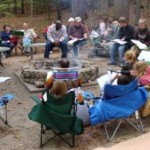How can you do for the least if you don’t know the least?
A couple of days ago, Jeremy at “Till He Comes” wrote a great post called “16 Ways to Build Relationships With the Poor.” (UPDATE: Thanks to Jeremy for pointing out that this post was actually written by Sam as a guest post on Jeremy’s site.)
As you can tell from the title, the point of Jeremy’s post is to help people build relationships with people in need. Why would Jeremy focus on “the least” among us? Well, Jesus did say something about God’s people (the righteous) being those who care for “the least.”
But, there’s another reason to focus on finding and building relationships with the least. Several years ago, I realized that I was living an isolated life – isolated from unbelievers and from the poor, hungry, sick, prisoners, etc. I was living in a “Christian bubble” (some call it a ghetto).
You see, as great as it is to spend time with other believers (and people who are like us), it’s just as important that we also disperse and spend time with those who are not believers (and people who are not like us). But, for Christians like me, this may be difficult to put into practice.
Because of that, examples like the ones that Jeremy gives in his post can be very beneficial. Jeremy lists these 16 ways to build relationships with the poor:
- Help unemployed single mothers and families find jobs.
- Help families find housing they can afford.
- Buy products and services from people you know are struggling to keep a roof over their heads. Don’t look for the “cheapest” option, but for the person or business that most needs your business.
- Refer people you know to a business or person who needs the business.
- Tip generously at restaurants, especially when you know that the person who served you really needs it. Sometimes you can tip people who don’t usually receive tips, such as the guy at the car alarm shop who repaired your car alarm.
- Give commendations to managers of businesses for employees who helped you, especially for employees you know really need their job.
- When things don’t go right in your dealings with a business, do not threaten an employee with “I’m going to get you fired,” or “You will get you in a lot of trouble.” That vicious threat can terrify someone for whom that would mean losing their only source of income, and their only way to provide food, clothes, and housing for their children.
- Volunteer to help. This might mean helping repair someone’s house or car (so they won’t need to pay someone to do it), taking them to the doctor (so they won’t have to pay someone to drive them), or even picking up something they need (so they won’t have to pay for the gasoline to get them there).
- As you walk, run, or drive around town, keep an eye out for furniture and other household items set out on driveways with “Free” signs attached. Some of these items are in excellent condition and can be given to someone who needs it.
- Find out what your friends need and decide if you can meet any of their needs with some of the “stuff” you have in the closets, garage, and attic.
- After an event where a lot of food was prepared, contact certain people who are short on food and plead for their help in “taking some of this food off our hands so we won’t have to throw it away.”
- Invite your friends to dinner and making sure they take plates of “extra” food home with them.
- If you find something at a store, garage sale, or thrift shop that you know one of your friends needs, buy it and give it to them.
- Remember friends on their birthdays and at Christmas. This might include flowers, a gift, or inviting them for dinner, but always includes spending time with them when possible.
- Pick up trash on inner city streets and alleys. This improves living conditions in several ways for the people who live there, many of whom are poor. Explaining how that works would require a post of its own.
- Spend time with your friends, especially when you know they need someone to sit with them, listen, hug them, weep with them, and rejoice with them.
Obviously, there’s nothing more right about doing the things above than doing other things to help, serve, and love the people around you in Jesus’ name. Of course, there’s nothing wrong about doing those things in Jesus’ name either.
The great things about Jeremy’s list is that he focuses on building relationships – getting to know people – not just treating them like a project or anonymous group.
So, whatever it takes, get to know the people around you – especially those who are poor, hungry, thirsty, sick, prisoners, etc. Serve them and love them in Jesus’ name… and while you’re doing that, don’t forget the first part: get to know them. You may be surprised to find that God will use them to teach you something about himself.
The changing face of full-time ministry
A few days ago, when I decided to start writing a short post about “full-time ministry,” I did a Google search on the phrase. I found something interesting. More and more people are writing about (and, hopefully, living) the fact that “full-time ministry” is not something that is relegated to a select few among the church – a few who are paid to do full-time ministry.
Instead, more and more people are realizing that all of Jesus’ followers are called to follow him into full-time ministry – that is, to love God and love others and serve people all the time, wherever they are, regardless of their vocation. (In fact, there are some who are recognizing that those who are paid as “vocational ministers” may be actually doing less ministry/service than those who are working in other vocations, but that’s a topic for another post.)
To be honest, I was surprised (and excited) to find that so many people are beginning to define “full-time ministry” in the way that we find in Scripture – that is, full-time ministry is not about being paid as a vocational pastor to do certain duties for a church-based organization. People are living as full-time ministers while working as sales people, mechanics, programmers, teachers, and many other occupations. People are living as full-time ministers while living as mothers and fathers, students, retirees, etc.
When I read the New Testament, this is the description of ministry that I see – everyone serving others as they share their lives with others (both brothers and sisters in Christ and those who are not believers). When all believers see “full-time ministry” as what happens when they follow Jesus in loving and serving others, I think we’ll begin seeing the kind of response that we read about in the New Testament.
But, as long as we continue to see “full-time ministry” as the responsibility of only a few who are paid to serve on behalf of the whole church, then the spread of the gospel and the maturity of the church will be hindered.
So, like I said at the beginning, I’m excited to read about more and more people seeing “full-time ministry” as their responsibility – at least when it comes to interacting with unbelievers. Unfortunately, I think many still see “full-time ministry” among the church as the responsibility of only a few paid professionals.
God has placed us among people – both unbelievers and believers – in order to work through us to demonstrate his love for them, to proclaim the good news of Jesus Christ, and to build up the church so that we all grow in maturity, unity, and faith in Jesus Christ – that is, God has placed us among people to work as full-time ministers.
Digging deeper into mutual service among the church
Last week and the beginning of this week, I wrote a series called “To equip the saints for the work of ministry.” The point of that series was to consider how variously gifted individuals might prepare Jesus’ followers to do the hard work of serving others. But, this entire series was based on an important premise.
That premise is that God works through all of his children in various ways to build them all up in unity, faith, and maturity (edification). In other words, without mutual service, the equipping that Paul mentioned in Ephesians 4:12 is impossible. Without mutual service, the church will not be built up in unity, faith, and maturity the the level that we could be.
I’ve been excited recently to read several other posts (and series even) that are focused on this same topic and related topics.
For example, Jim at “Crossroad Junction” wrote a series on the topic of “Ekklesia and Diverse Gifts,” and he touched on the importance of mutuality in his post “The Imperative of Participation.” Here’s an excerpt from his great post:
Time and again Scripture exhorts us to avoid passivity. As such, God intends for our meetings to be incubators where we identify, develop and learn to use our gifts for our mutual growth and edification.
That’s because God’s gifts are not given for purely personal or individualistic purposes. Rather, when we meet we should be ministering to each other, each according to our unique gifts. Using our gifts within the church, in turn, allows us to become a gift – to each other, the world and, most importantly, to Jesus.
As Jim explains, mutual service and participation in each other’s life (even and especially when we gather together) is an imperative (command) and works against a natural tendency toward passivity.
Similarly, Eric from “A Pilgrim’s Progress” deals with this issue in his post “Priesthood and Reciprocity.” But, Eric looks at mutual service from a different (but just as necessary) perspective. Here’s a snippet from his post:
There is a tendency (and I’m not sure why this exists) among some Christians to be always serving but not receiving it. If you ask them if they need help, they almost always say no. I think they do this because they don’t want to cause any work for anyone else; therefore, their motives seem pure. However, in doing this they actually stunt the growth of their brothers and sisters. This is because they are keeping them from serving.
The one-anothers have a reciprocal nature. We all grow up together in Christ as we serve one another. We help others grow by one anothering together. This involves both giving and receiving. If we only focus on the giving, we end up inadvertently hurting both ourselves and others.
Eric’s is absolutely right… Mutual service means that we must be active (not passive) in serving others, and it also means that we must be willing to receive (even welcome) the service of others.
But, if we are serving one another, another question pops up…
But, don’t worry… Miguel at “God Directed Deviations” as asked the question for us. If we are serving one another, then “What Do We Need Church Leaders For?”
I think that leaders are important to the body of Christ, but not for the reasons that are usually presented. I’ll leave my answer to Miguel’s question for later, but for now, I’ll leave this post with this question for you…
What are some issues that keep the brothers and sisters in Christ who you know from mutually serving one another?
God enjoys a good light display
Last year, I wrote a post called “An inspirational light display.” We strung lights on our house to celebrate Christmas because, well, that’s what you do around here. But, when I was looking at the lights, I realized that God loves a good light display. Of course, I wasn’t thinking about the string of twinkling icicle lights on our house. That’s not the kind of light that pleases God…
————————-
An inspirational light display
God cares about light displays. But, I’ll get back to that in another 200 words.
Last weekend, our friend Jared helped us string white icicle lights along our roof line. Many of our neighbors have decorated their houses, porches, trees, and yard ornaments with lights: white or multi-colored; twinkling, blinking, or steady.
Of course, there’s nothing in our neighborhood to compare to Mr. Grizwald’s light display. There are a few families in our town or the towns around us who seem to be attempting to give Clark a run for his money. And, then, there was the TV show about the houses around the country that have been decorated with hundreds of thounsands – even one million – lights.
So, are you thinking about a light display this Christmas? You should. Seriously.
Why? Because God enjoys a good light display. Jesus talked about this in the Sermon on the Mount:
You are the light of the world. A city set on a hill cannot be hidden. Nor do people light a lamp and put it under a basket, but on a stand, and it gives light to all in the house. In the same way, let your light shine before others… (Matthew 5:14-16 ESV)
Apparently, according to Jesus, God enjoys light displays that light up an entire hillside… and entire city. He wants a light display that cannot be hidden. Of course, this passage is not only about Christmas light displays, but certainly Christmas lights fall into this category.
I’m thinking that the early church’s emphasis on light displays (especially at Christmas-time) was one of the reasons (perhaps the main reason) that Paul told followers of Jesus let their lights shine in the world. Their light displays were so spectacular that their pagan neighbors could not help but notice.
So, we can see that light displays – including Christmas light displays – were important to Jesus, and they were important to Paul and the early church. If light displays were that important, then certainly they should be important to us as well. We’re not told whether we should choose white or multi-colored lights, or whether the lights should blink, twinkle, or remain on steadily. Perhaps that doesn’t matter as long as there is an awesome and inspirational light display.
Hold on one second… Are you sure? You really don’t think Matthew 5 is about Christmas lights? You think I should read further? Let me see…
You are the light of the world. A city set on a hill cannot be hidden. Nor do people light a lamp and put it under a basket, but on a stand, and it gives light to all in the house. In the same way, let your light shine before others so that they may see your good works and give glory to your Father who is in heaven. (Matthew 5:14-16 ESV)
Ah. I see. But, what about Paul telling Christians to shine their lights? That’s about light displays, including Christmas lights, right? No? We’ll see about that…
Do all things without grumbling or questioning, that you may be blameless and innocent, children of God without blemish in the midst of a crooked and twisted generation, among whom you shine as lights in the world, holding fast to the word of life, so that in the day of Christ I may be proud that I did not run in vain or labor in vain. Philippians 2:14-16 ESV)
hmm…. hmph.
Well, readers, I apologize. Apparently, someone – who shall remain nameless, but his initials are HS – wants to ruin a perfectly good inspirational Christmas message by demanding that I consider what Jesus and Paul were actually saying. Someone thinks these passages are about living our lives in a way that demonstrates our trust in God and that they have nothing to do with Christmas lights.
But, I’ll leave that up to you – my loyal readers – to decide for yourselves. If you think Jesus and Paul are talking about Christmas light displays, then I hope your house is the brightest on the block.
But, if you think they’re talking about living your life in a way that others notice and in a way that points others toward God through Jesus Christ, well, I guess that’s fine, too.
Just don’t expect to win the best decorations or tackiest lights awards this year!
Watching the church change from barren to fruitful
Roger at “SimpleChurch Journey” has shared a very interesting list in his post “Choudhrie’s Challenges Re-Visited.” The post is a summary of an essay written by Victor Choudhrie titled “Mega Church to Meta (Beyond) Church” and subtitled “21 Steps to transit from being a barren church to a millionaire of souls.”
Here are some of the interesting “steps” (interesting to me):
3. Phase out programmed Sunday ‘services’ while implementing informal, small
gatherings. The Bride of Christ must have intimacy with her Lord every day, not only for a
couple of hours a week, lest she become unfaithful.4. Replace Mosaic tithing with Christian sharing, thereby harnessing the enormous,
financial resources, hospitality and goodwill available in Christian homes.5. Dispense with wafer-and-sip Holy Communion and promote breaking of bread with
simple Agape meals (love feasts) from house to house, that believers take with glad
hearts, ‘and the Lord added to His numbers daily’.7. Shift from being a spectator-oriented church to a ‘metastasizing’, interactive,
participatory, prophetic church. Empower men, women and youth, to get the dragon off the driver’s seat.10. Know your identity in Christ: You are a royal-priest, made so by the blood of the Lamb.
Dismantle the ‘Reverend’ culture that divides clergy from layman.14. Empower every Sunday school, bible school, prayer cell, women’s fellowship, and
cottage meeting, by calling them full-fledged, authentic churches.18. Reorient your personal paradigm. Your business, workplace or home, wherever you
spend most of your time, is your ‘primary nuclear church’. It matters little whether you
are the CEO, or the janitor or the kitchen queen; you are a full-time minister there and
accountable.
Obviously, there are other “steps” in Choudhrie’s essay besides the ones listed above (14 other steps, to be exact).
I love that the focus of these “steps” is to empower, equip, and send all believers as priests in God’s kingdom, wherever they live, work, etc. These steps recognize that the Spirit indwells all of God’s children, and, therefore, he can and does work through all of them. He does not only work through a few of them.
Given the many exhortations in Scripture toward mutual service, mutual discipleship, mutual edification, mutual teaching, etc., I agree with Choudhrie that taking these steps would help the church grow toward maturity and fruitfulness.
What do you think?
Another example: Mutual edification through serving together
In yesterday’s post, “Examples of Mutual Edification When the Church Gathers,” I offered several examples of how we work together to build up on another when we get together. I included examples of studying Scripture together, singing together, praying together, and eating together. (As I said in that post, a Facebook friend suggested that I write about those examples.)
At the end of that post, I also said that there was an absolutely necessary element that leads to mutual edification. What element is that? It’s sharing our lives with one another throughout the week in many different way and at many different times.
There’s something else that we do that always results in us building each other up, and this activity has additional benefits as well. I’m talking about serving others together. Don’t misunderstand me. It can be very beneficial to serve others individual, and we often do this as well. But, when we serve others together, we get the added benefit of having many opportunities to edify one another as we serve.
While the specific types of service can be “big” things, even small acts of serving together can be a catalyst for mutual edification. We’ve done simple things like rake leaves, cut grass, work at a food pantry, make food, etc. We’ve also done bigger things together like traveling across the state, to other states, and even around the world together in order to serve others. However, like I said, even simple tasks of service allow us to not only love others, but also to build up one another while we serve.
How do we build up one another while we serve others? Well, certainly, there are usually opportunities to talk and encourage and teach one another as we serve side by side. Similarly, as we find out what different people are going through, we’re able to pray together as we serve. But, even the encouragement to serve is a method of edifying each other.
You see, when we do some kind of service like this, it’s usually initiated by one of our brothers or sisters who knows the person being served and the need for service. This brother or sister tells others about the opportunity/need, we pray about it, and then decide as a group how to serve the person.
There have a been a few times when I did not want to serve someone… oh, I knew that I should want to, and it showed me that my heart was not in the right place. Because of the example and encouragement of my brothers and sisters and the opportunities that they brought to our attention, my heart / love issue was brought to the surface (and of course, I wasn’t the only one). Thus, together, we are encouraged to grow in love and concern for others.
Interestingly, I’ve found recently that the teenagers among us often take the lead in these opportunities to serve together. They seem to love to gather together for the purpose of caring for someone else. What an encouragement this has been to the rest of us!
How about you? Have you ever served other people together with brothers and sisters in Christ? Have you found this to also be an opportunity to edify one another?
Replay: Prayer and the Ministry of the Word
Three years ago, I wrote a post called “Prayer and the Ministry of the Word.” Of course, that’s a phrase that comes from Acts 6, when the church was having a problem. Some of the widows (the Hellenistic widows) were not receiving food that they needed. So, they church brought the problem to the apostles, who gave them some counsel about who to choose to take care of this issue. (As a side note, it is interesting that the apostles left it up to the church to choose the people…) Why did they apostles not take care of this issue? Because they were busy with “prayer and the ministry of the word.” This phrase has been requisitioned by many church leaders as justification for spending many hours each week praying and studying Scripture in order to prepare sermons, homilies, and teachings. Is that a valid interpretation and application of that phrase?
——————————
Prayer and the Ministry of the Word
Acts 6 begins like this:
Now in these days when the disciples were increasing in number, a complaint by the Hellenists arose against the Hebrews because their widows were being neglected in the daily distribution. And the twelve summoned the full number of the disciples and said, “It is not right that we should give up preaching the word of God to serve tables. Therefore, brothers, pick out from among you seven men of good repute, full of the Spirit and of wisdom, whom we will appoint to this duty. But we will devote ourselves to prayer and to the ministry of the word.” And what they said pleased the whole gathering, and they chose Stephen, a man full of faith and of the Holy Spirit, and Philip, and Prochorus, and Nicanor, and Timon, and Parmenas, and Nicolaus, a proselyte of Antioch. These they set before the apostles, and they prayed and laid their hands on them. And the word of God continued to increase, and the number of the disciples multiplied greatly in Jerusalem, and a great many of the priests became obedient to the faith. (Acts 6:1-7 ESV)
Elders (pastors) sometimes apply this passage to themselves, arguing that elders should focus on “preaching the word of God” or “prayer and the ministry of the word.” In this line of thinking, the elders should spend their time praying, studying, and preaching, while other people in the church carry out the other activities (such as waiting tables or caring for widows).
Now, to begin with, I think believers often have a wrong understanding of what it means to “preach the word of God.” As I’ve suggested in other posts (i.e. my series “Preaching in the Old Testament“), “preach the word” does not mean “give a sermon”, but to proclaim or announce the Gospel. Similarly, I’m not convinced that “the ministry of the word” means studying the Bible and commentaries and other books for 20+ hours per week in order to prepare a sermon.
However, beyond these points, I think there are at least two reasons why it is not valid for elders to apply this passage to themselves and their own responsibilities.
First, elders are not mentioned in this passage. Luke only mentions apostles. There is no indication in Scripture that the responsibilities of apostles are to be assumed by elders.
Second, and perhaps more important, the apostles seemed to have devoted themselves “to prayer and to the ministry of the word” for a limited amount of time. In other words, even the apostles did not continue this same type of devotion of time forever.
Within a short time, we see evidence in Scripture that the apostles were soon moving about from place to place. For example, Peter is traveling “from here to there” (Acts 9:32) and eventually spent some time in Joppa (Acts 9:36-10:22) and Caesarea (Acts 10:23-48) before returning to Jerusalem (Acts 11:2).
We know that Paul traveled throughout his work as an apostle. Also, when he wrote to the church in Corinth, he indicated that it was normal for apostles to travel (1 Corinthians 9:1-5). Paul also indicates that Peter has been in Corinth at some point (1 Corinthians 1:12). Paul tells us that his work as an apostles included serving people diligently (1 Thessalonians 2:7-10 among others).
(According to tradition, all of the apostles traveled to different places in order to proclaim the gospel of Jesus Christ and to strengthen the churches.)
So, whatever it meant for the apostles to devote themselves “to prayer and to the ministry of the word”, it seems to have been a short-term devotion. Soon, they were no longer spending all of their time on this activity, but were traveling around proclaiming the gospel and serving people – the very thing they said that they did not have time to do in Acts 6.
Perhaps, the apostles recognized that there was a specific thing for them to do at that time. Instead of allowing other people’s responsibilities from hindering them, they exhorted the people to take care of their own responsibilities. In fact, this is exactly what they told those who were complaining: take care of this yourselves.
When this particular project was complete (whatever it was), the apostles continued with whatever God called them to do next. For most of the apostles, this seems to be traveling from place to place to proclaim the gospel and strengthen the churches.
This passage is not an exhortation for elders (pastors) to spend many hours praying and studying Scripture. Instead, this passage is an exhortation for all believers to not be distracted from whatever God has called us to do… even if that responsibility eventually ends and God then calls us to do something else.
Learning how to love your neighbors in a new culture
My friends Paul and Laurel moved to the Congo a few months ago. If you’ve heard anything about the Congo in the news lately, they’re in the area of that country that has experienced an ebola outbreak recently.
Recently, they wrote about learning how to love their neighbors in that new culture. They published their thoughts on their blog in a post called “Building relationships in a new culture: Freely go and visit.”
Responding to something they read in a book, they write:
He said that for Westerners, we usually seek to build relationships by inviting people over for a set date and time. We do this a few times and feel like we’re getting to know someone. However, he explains, that in an African culture, that would be out of place for us to do as the visitor. Good to know! Instead, he says it is totally appropriate to drop in, unannounced at someone’s house to spend an undetermined amount of time with a person and their family. If it’s around a mealtime then you would just share in that meal with them. If they had other plans then they would just cancel them! This is how the author encourages Westerners to pursue relationship building in an African cultural context. It’s hard to imagine from my Western point of view because we would usually feel so put out if someone stopped by, especially at a mealtime!
They have made it a personal goal to go against their own inclinations and tendencies and to drop in on their neighbors occasionally.
Now, I realize that most of my readers do not live in Africa. But, do you know your neighbors well enough to know how to show God’s love to them? Have you ever thought that your tendencies may seem rude to your neighbors? And, what they do that seems rude to you may not seem rude to them?
Have you ever gone against your own tendencies or habits in order to show someone that you cared about them?
Replay: Living doctrine at the campsite
Three and a half years ago, I wrote a post called “Living doctrine at the campsite.” When I wrote that post, we had just spend a weekend camping together with the church. As you can imagine, we spent alot of time together, did alot of different things together, and even talked about alot of Scripture together. At one point, we talked about Acts 2:42 together, and I realized that we had been living that passage during our camping weekend. The weekend with our brothers and sisters reminded me of the important connection between doctrine and community.
———————————–
Living doctrine at the campsite
This weekend, we went camping with the church. Friday evening, several families camped near Falls Lake. A couple of families joined us around the campfire Friday night. The next day, one family had to leave, but two more families camped with us. Several people joined us during the day on Saturday to spend time together at the campsite.
Sunday morning, many people who did not camp came to the campsite to meet together. We sat around the campfire (well, the remains of the campfire), and talked and sang and prayed. We talked about several different topics, but at one point, the discussion turned to Acts 2:42:
And they devoted themselves to the apostles’ teaching and fellowship, to the breaking of bread and the prayers. (Acts 2:42 ESV)
According to this passage, the early church in Jerusalem devoted themselves to the apostle’s teaching (or doctrine). We talked about how the church often interprets this phrase as “they spent time listening to the apostles teach”. But, as many people pointed out, this simply sentence goes far beyond listening to someone teach.
Yes, the early church continued steadfastly in the apostles’ doctrine, but they did not do this with their ears only; they continued in their lives. They lived what the apostles were teaching them.
As I was listening to my friends sitting around the campfire helping one another understand what it means to live out the doctrine of the apostles, I couldn’t help but remember the previous 48 hours that I had spend with many of my brothers and sisters in Christ. You see, I heard what they were saying Sunday morning, but Friday night and all day Saturday, I SAW them continuing steadfastly in the teachings of the apostles.
It’s one thing to hear someone encourage others to confess their sins, but it’s another thing altogether to have a brother confess his sins to you. It’s one thing to hear an exhortation to love one another, but it’s another thing altogether to see brothers and sisters who want to spend time with one another, who share their food with one another, who help one another around the campsite, who SHOW their love for one another.
As I sat around that campfire Sunday morning, I couldn’t help but praise God for the blessing of community – not community in name only, but true community – a family who loves one and cares for one another. We’re not perfect, and we’re continually seeking to grow closer to God and to one another, but we are a community.
It’s easy to see now why Luke connected “the apostles’ teaching” and “fellowship”. I don’t think you can have one without the other.
(If you’re interested, I’ve posted pictures from our camping weekend on our family blog and in a facebook photo album.)
When you have nothing left to give…
In the last few weeks, I’ve had several good, encouraging, challenging conversations with some brothers and sisters in Christ who are seeking to follow Jesus as he leads them to give to and serve others. I’m not just talking about giving out money to people in need; I’m talking about spending time with people that God brings into their life, helping them with various life issues as well as helping them follow Jesus.
These friends have each shared examples of times when God has allowed them to greatly help other people. Sometimes, they were helping other brothers and sisters in Christ, and sometimes they were loving on and serving people who were not (yet) followers of Jesus. They were encouraged and humbled by the fact that God was using them in ways that are often surprising and unexpected.
But, occasionally, my friends also shared another concern: there are so many people who need help, and my friends do not always have the money, time, energy, resources, etc. to help them.
Now, there are many different reasons for this kind of feeling, and I don’t want to get into all of those reasons. Instead, I’m hoping that this post will be an encouragement to those who find themselves in a similar situation.
First, I want to thank for giving of yourselves in this ways. You are demonstrating the love of God, as John described here:
By this we know love, that he laid down his life for us, and we ought to lay down our lives for the brothers. But if anyone has the world’s goods and sees his brother in need, yet closes his heart against him, how does God’s love abide in him? Little children, let us not love in word or talk but in deed and in truth. (1 John 3:16-18 ESV)
When we give to others who are in need, the love of God is abiding in us, and we are loving in deed and in truth.
Second, please notice something that John wrote above, “But if anyone has the world’s goods and sees his brother in need…”
You are not responsible for giving something that you do not have. This is very difficult for people who spend so much of their money, time, energy, and resources helping others. But, when the money, time, energy, and resources are gone – when you truly have nothing left to give – then you are not withholding the love of God when you do not give to someone.
Of course, even though I say that – and even though John makes the point clear in the passage above – it’s still difficult to accept. Why? Because we still know that people are in need and because we still want to help them.
But, remember, God loves these people much more than you do. He has more resources than you have. Do not allow anyone or anything (not even yourself) to lay guilt on you for not helping someone when you have nothing to give.
In Jesus’ name, share what he has given you in order to demonstrate the love that God has lavished on you. And, accept that if God has not given you anything to share with others, then he does not want you to share anything with them.










